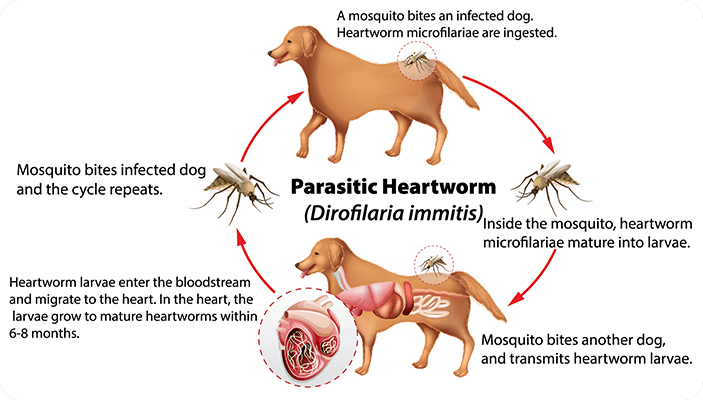Pet diseases Leptospirosis and Lyme can be life-threatening to your pet, but there are ways to protect against them. Luckily, there are annual vaccinations for both. At many practices these pet diseases are part of their core vaccinations, meaning they are recommended for all dogs because all dogs can become infected with either and both can be fatal.
Leptospirosis is a pet disease that is usually contracted by coming in contact with infected urine. At first thought, you might think that it is easy to prevent, but not really. Infected urine from wild animals can be anyplace, including puddles you come across or water your dog swims in. It is treatable if caught in time, but it is preventable with an annual vaccine. Additionally, if your pet has been regularly vaccinated, most of the vaccine companies will pay for treatment, however, it would be very rare for a vaccinated pet to become infected.
Lyme disease, as you probably know, is carried by ticks. But did you know that this untreated pet disease can result in kidney failure and can be fatal? It is so important, especially in wooded areas, to vaccinate for both Lyme disease and use effective tick control. And, flea/tick prevention should be practiced year-round. There hasn’t been a winter for years that has not had some days that are warm enough for the ticks to be active and even mosquitoes to be viable.

Heartworm is spread by the bite of an infected mosquito. It is not spread from animal to animal. Since so many pets are adopted from the south, the incidence of heartworm has greatly increased. There is a percentage of pets form the south, where heartworm is very prevalent, and although they are tested heartworm negative, the life cycle takes 6 months to see a positive test. It is therefore recommended that if you adopt a pet from an endemic area they should be tested prior to arrival and again 6-7 months later.

One vet who has been practicing for 30 years has never treated a dog that was consistently on heartworm preventive. It is very effective and safe. Similar to the manufactures of the Leptospirosis vaccine, the different manufacturers of heartworm preventive will pay for heartworm treatment if your pet becomes infected while on consistent preventive medication. Heartworm prevention can be applied as a topical, given orally, or as an injection.
The topical and oral are monthly and the injectable will last for 6 or 12 months. Many vets recommend the injectable for those who have difficulty being consistent with monthly prevention since it is so important. Heartworm treatment is quite long and can be very difficult for your pet. Even when treatment is effective, meaning all of the adult heartworms have been killed, there can be permanent damage to your pet’s heart and lungs.
Most veterinarians test all dogs annually for heartworm disease and the three most common tick-borne diseases, including Lyme disease. While the in-office test does test for heartworm disease, it only tests for exposure to the tick-borne diseases, not an active disease. Your vet should always confirm with an outside test if their in-office test is positive.
If your pet is positive for Lyme, a C6 test to see if in fact it is an infection or just exposure is recommended. And, even if it is just exposure, it is recommended to analyze a urine sample to be certain there are no issues with protein in the urine from a previous infection. If your pet is positive for Anaplasma or Ehrlichia (the other 2 tick borne diseases), a routine blood panel will reveal if treatment is necessary.

There are over the counter flea and tick preventives that are topical, however, be aware that they are not all the same. On the other hand, there are a number of all oral flea and tick preventives that have been shown to be quite effective. They last from 1 month to 12 weeks depending on which you use.
Remember though, the most effective flea, tick, and heartworm preventives are those that you will be consistent with. Your veterinarian can help you decide which is best for you. Find veterinarian for your pets!





